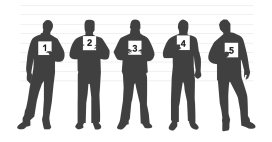A new report from Fair Trials has shown that the increased reliance on trial waiver systems to resolve criminal cases is undermining the right to a fair trial across Europe. Efficiency over justice: Insights into trial waiver systems in Europe is based on research into trial waiver systems by partners in five EU countries – Albania (ResPublica), Cyprus (Kisa), Hungary (Hungarian Helsinki Committee), Italy (Antigone), and Slovenia (Mirovni Institute).
Trial waivers take place when someone who is suspected of a crime gives up their right to a trial. It means they give up their right to provide and challenge evidence, and to be presumed innocent. In return, they usually receive some kind of benefit – for example, a sentence that is supposedly lower than if their case went to court and they were found guilty.
As our previous research showed, there has been an explosion in the use of trial waiver systems in recent years throughout the world. About half of prosecuted cases in Europe are processed outside the framework of a trial. This latest report examines the impact of this.
Emmanuelle Debouverie, Senior Legal and Policy Officer at Fair Trials said:
“People are being coerced into admitting guilt and waiving their right to a trial because authorities believe they are quicker and cheaper than trials. Cost-cutting should not take precedence over justice.
“States made a policy choice to introduce trial waiver systems as a way of dealing with overburdened justice systems, giving prosecutors the tools to cope with the number of cases coming into the system. But dealing with cases quickly and on the cheap has taken precedence over justice, leading to fast-track punishment without proper safeguards.”
“As long as States continue to under-invest in criminal justice systems and criminalise people for minor offences, states will have more cases than they can deal with.
“We’re calling on governments across the Europe to find better ways to relieve overburdened criminal justice systems, including by better investment in criminal justice systems and decriminalising certain kinds of behaviour, such as drug use and other minor offences.”
The key findings of the report include:
Consent is a myth: While ostensibly people choose a trial waiver, in reality there are many pressures on accused people. They are moved by systemic incentives that are independent from the merits of the case, or their guilt or innocence, including, the threat of months or years in pre-trial detention; lengthy and costly proceedings (court costs, lawyer fees); losing their job, business or home. In addition, overburdened police forces, prosecutors, courts and sometimes defence lawyers may exert direct pressure on people to admit guilt in order to resolve a case more quickly.
Limited access to and ineffective procedural rights: Accused people should be fully aware of the facts of the case and the legal consequences of accepting the waiver. However, often they are not helped by a lawyer when approached by prosecutors with an offer. Lawyers do not have the resources and power to provide an effective defence, in particular in legal aid cases. In addition, accused people and their lawyers do not have timely and full access to case files to prepare their defence; translations of essential documents are lacking and interpretation services unavailable. Without these procedural guarantees, accused people are not in a position to knowingly consent to waiving their fundamental trial rights.
Ineffective judicial oversight: Courts are not scrutinising trial waivers sufficiently. In many cases, verifying the validity of a person’s admission of guilt and consent to a waiver can be limited to yes or no questions at a hearing. Overburdened courts are structurally incentivised to approve trial waiver systems, even when they present obvious problems.
There is systemic discrimination and racism: Trial waiver systems may play a role in fostering and increasing vulnerabilities and social exclusion as systemic discrimination and racism are likely amplified when deals and punishment is decided behind closed doors.
Blind spots – do trial waivers work? Despite their increasing use throughout Europe, trial waiver systems are not monitored or assessed, and states are unable to verify that they deliver their intended results of cost efficiency. Our research indicates that persons subjected to trial waiver systems do not always benefit from sentence discounts, that trial waiver systems may increase the rate of miscarriages of justice with innocent people admitting guilt for practical reasons, and that their fast and easy use may have the counterproductive effect of widening the criminal justice net, thereby feeding more cases and people (innocent or not) into the system, including into European prisons.
Click here to download the report.
Fair Trials has also produced a best practice guide based for policy makers based on our research and report into trial waiver systems in Europe. Download the best practice guide.


